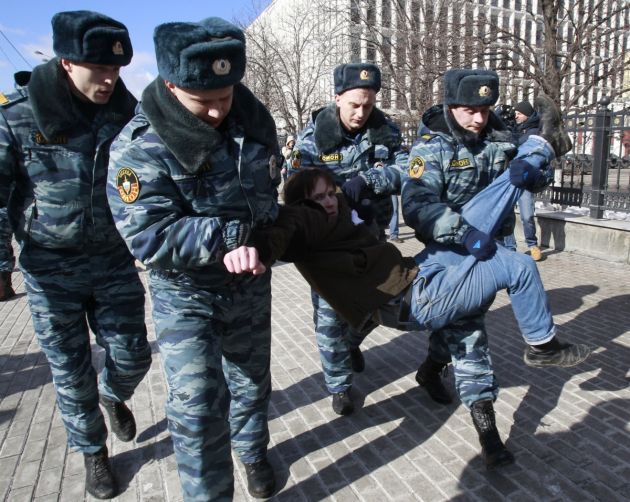Russian lawmakers back prison terms for religious offence

MOSCOW (Reuters) - Russian legislators have given initial approval to a law that would make offences against religion punishable by up to five years in prison after the Pussy Riot protest in Moscow's main cathedral outraged many in the mainly Orthodox country.
Three women from the punk band were jailed for hooliganism after their protest over Kremlin ties to the church, but the new law would make such stunts illegal by deeming they caused offence to religious feelings, ceremonies, sites or artifacts.
Critics of President Vladimir Putin, who has vocal support from the Russian Orthodox Church and has said the protest shows the state must protect believers, say the bill blurs the line between church and state and curbs freedom of expression.
Some three quarters of Russians consider themselves Russian Orthodox, though far fewer attend church regularly despite a resurgence of faith following the collapse of the Soviet Union in 1991. The country also has a large Muslim minority.
"We are a secular state, religion is separated from the state," said nationalist lawmaker Yaroslav Nilov, a promoter of the law in the parliament's lower chamber, the State Duma.
"But we are obliged to safeguard constitutional rights of our citizens," he said, before the Duma approved the bill on Tuesday by a vote of 330 to 7, in the first of three readings.
Putin said late last year that the Duma should not rush with the bill, which has also been criticized for vague wording that could allow for arbitrary application and undermine a delicate balance between Russia's many religions.
Nilov said the draft law would be changed before the second vote in the Duma to address such concerns.
But the prison terms, set in the draft at up to three years for offending religious feelings and up to five years for inflicting damage on religious sites or objects, are likely to remain in the legislation.
If passed by the Duma, it would face one vote in the upper house before going to Putin for his signature.
Putin's relationship with the church has strengthened since Pussy Riot band members entered Christ the Savior Church last year and sang a profanity-laced song, urging the Virgin Mary to "throw Putin out" at the height of protests against his rule.
He has called for the church to have more say over family, life education and the military, and has tried to mix spirituality with his own brand of patriotism.
Russia's human rights ombudsman, Vladimir Lukin, has said the legal system has sufficient instruments to safeguard freedom of religion, as guaranteed in the constitution, without a separate criminal statute on offences against religion.
Two members of Pussy Riot are still serving two-year prison terms after being convicted in August of hooliganism motivated by religious hatred. A court suspended the sentence of the third on appeal.
(Additional reporting by Maria Tsvetkova; Editing by Alison Williams)
